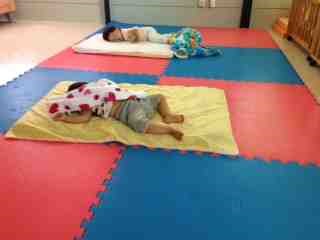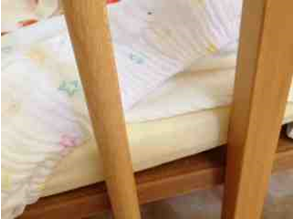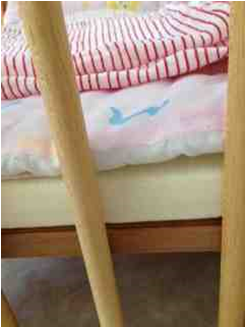Infants 2-12 Months
Infants 2 - 18 Months
Welcome to Kukuru and Akasan Class!
In this class, your baby is welcomed into our warm, nurturing, and supportive environment where we provide the perfect introduction to nursery life.
For babies, physical and emotional development is very important. They are completely dependent on their caregivers and need plenty of adult attention. Providing them food, a place to sleep and play, or changing diapers are needed to form firm attachment with teachers.
We organize their routine and various activities throughout the day to promote the babies’ all-around development. To develop properly, babies need to be given appropriate activities and toys. We encourage sensorial experience for the age and developmental stage of them both indoors and outdoors.
Separation anxiety begins at around 6 months, and important to note that every child is different, and some babies benefit from a transition period, while for others separation anxiety increases and takes the babies longer to bond with their teachers. Please understand adjustment to classroom environment may take a child who attends full time about 2 weeks before they begin to grow comfortable. We find that a child who attends part time, or takes long absences, requires a little longer, but each day gradually get a little better.
Our cribs measure 62 cm x 90 cm. Many parents purchase futon sets, but we have mattresses and all that is really required for children under one year of age. Mattresses include waterproof cover and a blanket. Once your child is 1 year old, we will begin to transition him or her to sleep on a futon on the floor, as they do in the toddler classes.
The logistics of breastfeeding is a very individualized situation for each child. How often you come will depend upon your child. For babies 2-3 months, breastfeeding time varies as some are eating every 2 hours and some are eating every 3 hours. The amount of milk varies as well; at 3 months we typically see babies eat between 600-800ml per day. If the milk supply you have left us is not enough, we will call you immediately and ask you to come and feed.
We value the importance of your involvement as parents and look forward to working with you. If you have any questions or concerns, please feel free to contact us.
Care Information by Age
Infants from 2 Months to 6 Months, Teachers will:
- Talk to the babies and make eye contact while feeding milk to build social and emotional skill.
- Converse with the babies (in English and Japanese)- Talking to them, reading a book out loud, singing songs and using differents sounds and musical toys throughout the day. These activities introduce a variety of vocabulary to build language and communication skills.
- Introduce Baby sign language.
- Provide plenty of physical contact such as baby massage and stretching to encourage bonding between the babies and us.
- Place baby on the floor, encourage them to have “tummy time.”
- Place toys slightly out of reach to encourage holding, rolling, and crawling, to build movement and/or physical development skill and cognitive skill.
Infants over 6 Months, Teachers will:
- Introduce food while feeding babies. For example, describe food as cold, warm, sweet, color, name of the food, build social, emotional, and cognitive skills.
- Converse with the babies - talking to them and reading out loud a book, singing songs, and using different sounds and music of toy throughout the day. These activities introduce many vocabularies to build language and/or communication skills.
- Introduce Baby sign language.
- Promote the babies’ imagination, and turning the pages encourages their fine motor skills through use of picture books.
- Place baby on the floor, encourage to have “tummy time.”
- Provide appropriate inside and outside activities to encourage them sitting, crawling, standing, and walking; go out by the stroller, playing on the grass field or sand box. These activities promote the sensory of the babies and gives them the opportunity to experiment in the world around them. Also, play with equipment such as a small slide to strengthen their muscles and develop coordination.
- Allow babies to play in the water and pool in summer. Water stimulates the babies’ sensory nerves.
- Use playdough, paints, and scribble on paper, which are good for babies to learn how to use their fingers and hands, build fine-motor and cognitive skills.
Drop Off, Pick Up, and Nap Time
Drop off/Supplies
- Please drop your child off from 8:00 - 9:30 a.m.
- If your child is sick or cannot attend for some reason, please call, or e-mail us before 9:00 am that day to let us know.
- Please sign in on the attendance sheet each day.
- Each child has his or her own locker where we keep all the supplies. Please make sure there are enough cloths, diapers or other supplies at the pick-up time and prepare them next day.
- Bottles and towels should be set in the prescribed place of your child.
- Lunch and snack for your child must be placed in the refrigerator in the classroom. (Also, please make sure that label all lunch boxes.)
- Please set up your child’s crib on the first day of the week.
- Please prepare all the supplies on the attached supply list and ensure labels are place on all personal items.
Pick up
- Please sign out on the attendance sheet each day.
- Children will not be released to any other person who is not designated for Alternative Pick-Up Authorization.
- Bottles, cups, containers for lunch and snacks, and dirty clothes should be taken home each day. Diapers are kept in CDC.
- Please take home your child`s bed sheet and blanket on the last day of the week.
- We open from 8:00 a.m.- 6:00 p.m., Monday to Friday. A late fee of ¥1,000 will be charged for every 15 minutes after 6:00 p.m.
Nap Time
- Nap time is approximately 11:30am to 2:30pm.
Additional Care Information
Gradual Entry into Kukuru class
Transition to start in Kukuru class we prepare five days transition for your child to feel comfortable being in the classroom.
| Day 1 | 2 Hours |
| Day 2 | 3 Hours |
| Day 3 | 4 Hours |
| Day 4 | 5 Hours |
| Day 5 | 6 Hours |
Birthday Party
- We hold birthday parties only in the months of the children’s birthday. Teachers will schedule a convenient date for your child`s party after consulting with you beforehand.
- Please bring a birthday cake for your child as a snack.
(Please ensure cakes contain no nuts.)
Weaning
- Weaning at CDC should be introduced when your child becomes 6 months. Begin feeding at home first; then, if there is no reaction to foods, you may bring food to CDC. We will start feeding him or her once a day at lunchtime, then gradually feed them twice a day.
- If you wish to bring lunch from your home, please prepare lunch in a lunch box or container with small spoons or forks.
- Please bring bibs and hand towels every day for cleaning hands and face after meals.
- Parents can bring each day whole milk or soymilk in a milk carton.
- We are unable to keep foods and liquids more than 24 hours in CDC.
Glass Bottles and Glass Lunch Boxes
Glass bottles and glass lunch boxes require a silicon cover for safety hazards.
Illness
Parents are obliged to make alternative care arrangements if their child shows signs of infectious disease, as follows.
- Temperature elevation over 38 degrees Celsius
- Vomiting or diarrhea (Attendance may resume 24hrs after fever, vomiting, or diarrhea symptoms subside)
- If both vomiting and diarrhea have occurred together, the exclusion time is 48 hours.
Medication
Parents of children who require prescribed medication to be administered at school by the Tedako CDC staff must complete a medication authorization form. A form must be filled out each day, or as needed. Japanese medical law prevents CDC staff from measuring dosage. Medication should be premeasured in a container by dosage before given to CDC staff.
Bath
Generally, we will not bathe child. We only bathe child on as needed basis (example: leak out from diaper).
Diaper Rash
We apply Vaseline or diaper rash creams for diaper rash; however, prescription medicines require a medication permit from CDC. Japanese medical law prohibits us from measuring the dosage. Please prepare medicine by dose.
Diaper Storage
We keep the child`s diaper package in Kukuru class. We will inform parents when to replenish.
Pillows
We do not recommend the use of a pillow in the crib since safety hazard. You may bring a pillow only as means to calm the child.
Bedding Supply Examples

Mattress, waterproof cover, and blanket on the floor

Mattress, waterproof cover, and blanket

Mattress, futon, and blanket



